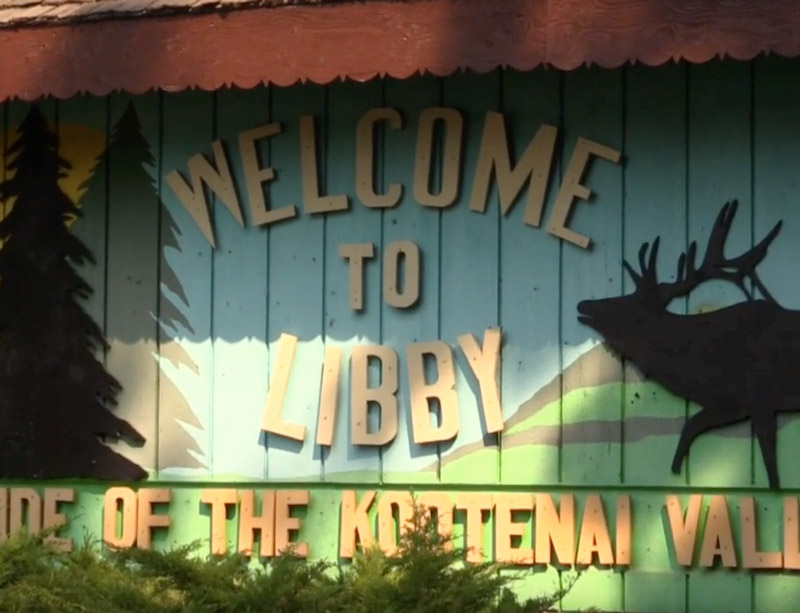Legal Fight Continues Over Asbestos Disease in Libby, Mont.

The Center for Asbestos Related Disease in Libby, Montana, dodged a potential setback recently when officials from the U.S. Department of Justice decided against joining a lawsuit alleging fraudulent medical practices.
Burlington Northern Santa Fe Railway filed the original suit in 2019 against the center – known as the CARD Clinic – alleging Medicare fraud that included unnecessary screenings and misdiagnosing patients with various asbestos-related diseases.
The railroad giant is facing more than a thousand asbestos-related injury claims stemming from its transportation of asbestos-laden products through its railyard from the nearby W.R. Grace & Co. vermiculite mine decades ago.
Part of its defense involves discrediting the CARD Clinic, a community nonprofit health organization that evolved from the widespread asbestos contamination and resulting diseases that have been part of the Libby area for decades.
The most serious disease has been pleural mesothelioma cancer, which is caused almost exclusively by exposure to asbestos.
CARD Clinic Saving Lives for a Decade
Libby is home to the longest-running human-made environmental disaster in U.S. history, where toxic asbestos was mined for more than 70 years. Although the mine closed more than 20 years ago, new cases still are being diagnosed today, primarily because of the lengthy latency period of asbestos diseases such as mesothelioma.
The Card Clinic staff includes a variety of asbestos disease specialists such as researchers, nurses, doctors and respiratory therapists.
BNSF Railway filed a whistleblower-type lawsuit that allows entities with evidence of fraud against a federal program to sue the alleged perpetrator. The federal government has the option to join, and considerably strengthen, the filing.
Federal Government Will Not Intervene in Libby
After almost a year of investigating, the U.S. Department of Justice Office of the Inspector General decided not to get involved, although it still could at a later date.
In its official determination paper, the Department of Justice said its decision “should not be construed as a statement about the merits of the case.”
A spokeswoman for BNSF said the company intends to proceed with the case on its own.
The suit contends that “novel lung conditions” have been detectable only by CARD Clinic professionals. Much of the CARD funding for diagnosis and treatment comes from the Centers for Disease Control and Prevention, a federal agency.
BNSF’s suit also points to widely conflicting diagnostics involving radiologists not affiliated with the CARD Clinic, some of which found no asbestos-related disease in patients.
In the past 10 years, the CARD Clinic has conducted more than 3,500 lung cancer and mesothelioma cancer screenings and 7,000 asbestos health screenings, according to the Daily Inter Lake, a newspaper in nearby Kalispell, Montana.
Officials at the CARD Clinic have staunchly defended the work being done there for years.
“The government’s decision not to prosecute on behalf of BNSF is a telling indication that the claims against CARD are largely a fabrication,” attorney Timothy Bechtold, who is representing the clinic, told the Daily Inter Lake. “I think that the most cynical view you can take when it comes to BNSF is accurate. They are a corporation, and they have corporate interests. They don’t care about the people in Libby.”
Montana Supreme Court Holds BNSF Responsible
Bechtold also told the Daily Inter Lake the lawsuit is an attempt to halt the diagnosing of asbestos-related diseases by closing the CARD Clinic, which would cap future liabilities.
In 2020, the Montana Supreme Court reaffirmed a lower court finding and ruled that BNSF Railway should be held liable for its role in adding to the contamination of Libby with toxic asbestos.
BNSF Railway had argued that federal regulations governing railroads protect it from liability issues, but the high court disagreed. The extent of the liability, though, was not specific.
“The decision to pursue this litigation was not taken lightly,” a BNSF spokeswoman told the Daily Inter Lake. “BNSF found very concerning allegations of fraud related to work at the Center for Asbestos Related Disease, Inc.”